系动词
- 格式:doc
- 大小:35.50 KB
- 文档页数:9
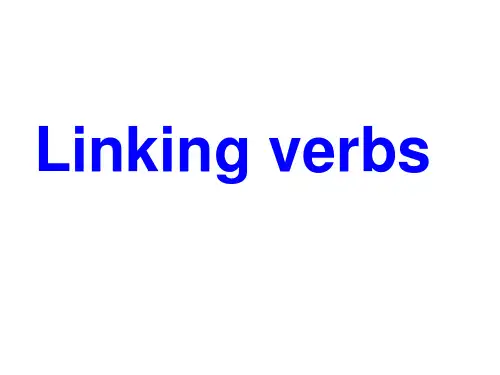
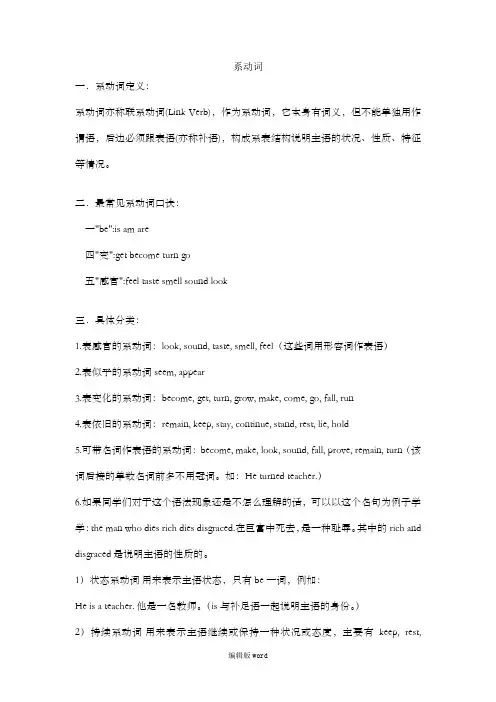
系动词一.系动词定义:系动词亦称联系动词(Link Verb),作为系动词,它本身有词义,但不能单独用作谓语,后边必须跟表语(亦称补语),构成系表结构说明主语的状况、性质、特征等情况。
二.最常见系动词口诀:一"be":is am are四"变":get become turn go五"感官":feel taste smell sound look三.具体分类:1.表感官的系动词:look, sound, taste, smell, feel(这些词用形容词作表语)2.表似乎的系动词seem, appear3.表变化的系动词:become, get, turn, grow, make, come, go, fall, run4.表依旧的系动词:remain, keep, stay, continue, stand, rest, lie, hold5.可带名词作表语的系动词:become, make, look, sound, fall, prove, remain, turn(该词后接的单数名词前多不用冠词。
如:He turned teacher.)6.如果同学们对于这个语法现象还是不怎么理解的话,可以以这个名句为例子学学:the man who dies rich dies disgraced.在巨富中死去,是一种耻辱。
其中的rich and disgraced是说明主语的性质的。
1)状态系动词用来表示主语状态,只有be一词,例如:He is a teacher.他是一名教师。
(is与补足语一起说明主语的身份。
)2)持续系动词用来表示主语继续或保持一种状况或态度,主要有keep, rest,remain, stay, lie, stand,例如:He always kept silent at meeting.他开会时总保持沉默。
This matter rests a mystery.此事仍是一个谜。
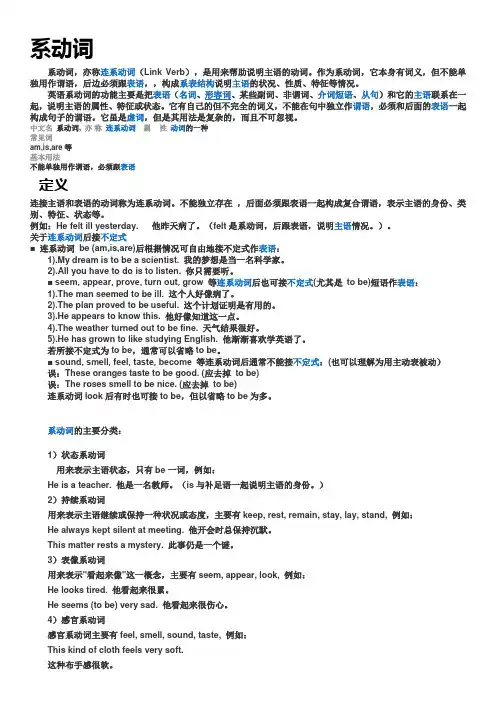
系动词系动词,亦称连系动词(Link Verb),是用来帮助说明主语的动词。
作为系动词,它本身有词义,但不能单独用作谓语,后边必须跟表语,,构成系表结构说明主语的状况、性质、特征等情况。
英语系动词的功能主要是把表语(名词、形容词、某些副词、非谓词、介词短语、从句)和它的主语联系在一起,说明主语的属性、特征或状态。
它有自己的但不完全的词义,不能在句中独立作谓语,必须和后面的表语一起构成句子的谓语。
它虽是虚词,但是其用法是复杂的,而且不可忽视。
中文名系动词, 亦称连系动词属性动词的一种常见词am,is,are等基本用法不能单独用作谓语,必须跟表语定义连接主语和表语的动词称为连系动词。
不能独立存在,后面必须跟表语一起构成复合谓语,表示主语的身份、类别、特征、状态等。
例如:He felt ill yesterday. 他昨天病了。
(felt是系动词,后跟表语,说明主语情况。
)。
关于连系动词后接不定式■ 连系动词be (am,is,are)后根据情况可自由地接不定式作表语:1).My dream is to be a scientist. 我的梦想是当一名科学家。
2).All you have to do is to listen. 你只需要听。
■ seem, appear, prove, turn out, grow 等连系动词后也可接不定式(尤其是to be)短语作表语:1).The man seemed to be ill. 这个人好像病了。
2).The plan proved to be useful. 这个计划证明是有用的。
3).He appears to know this. 他好像知道这一点。
4).The weather turned out to be fine. 天气结果很好。
5).He has grown to like studying English. 他渐渐喜欢学英语了。
若所接不定式为to be,通常可以省略to be。
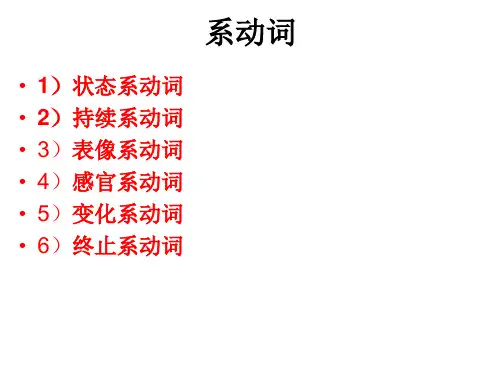
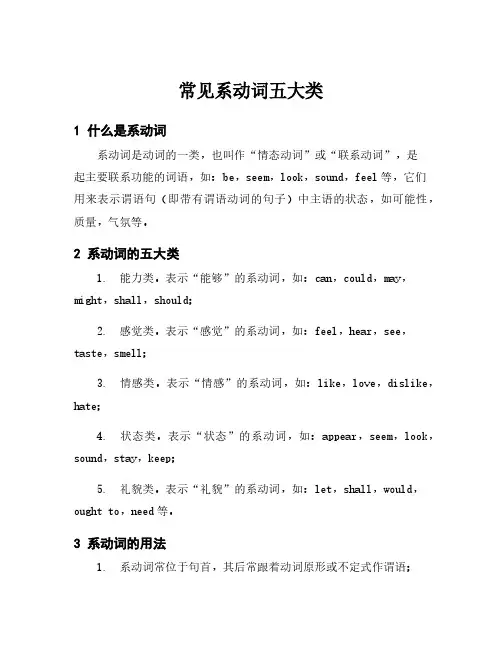
常见系动词五大类1 什么是系动词系动词是动词的一类,也叫作“情态动词”或“联系动词”,是起主要联系功能的词语,如:be,seem,look,sound,feel等,它们用来表示谓语句(即带有谓语动词的句子)中主语的状态,如可能性,质量,气氛等。
2 系动词的五大类1. 能力类。
表示“能够”的系动词,如:can,could,may,might,shall,should;2. 感觉类。
表示“感觉”的系动词,如:feel,hear,see,taste,smell;3. 情感类。
表示“情感”的系动词,如:like,love,dislike,hate;4. 状态类。
表示“状态”的系动词,如:appear,seem,look,sound,stay,keep;5. 礼貌类。
表示“礼貌”的系动词,如:let,shall,would,ought to,need等。
3 系动词的用法1. 系动词常位于句首,其后常跟着动词原形或不定式作谓语;2. 系动词与动词连用,构成谓语动词。
谓语动词表示主语情态或状态的变化;3. 系动词可以单独作谓语,如:He can read. 他会读书;4. 系动词可以同情态动词成句,如:I should have come earlier. 我本该早点来。
4 常见的系动词be,can,could,may,might,shall,should,will,would,must,ought to,had better,seem,look,feel,hear,taste,smell,like,love,dislike,hate,appear,stay,keep,let等。
5 系动词的重要性系动词是英语中最重要的词语之一,可以把句子中比较抽象的情态、状态、态度、环境或者其他类型的描述进行表达,为我们表达语句提供更多形式上的变化,有助于语句的简洁,增添句子的准确性和针对性,以及提高我们口语和写作水平。
所以学习和掌握系动词这一重要语法知识非常关键。
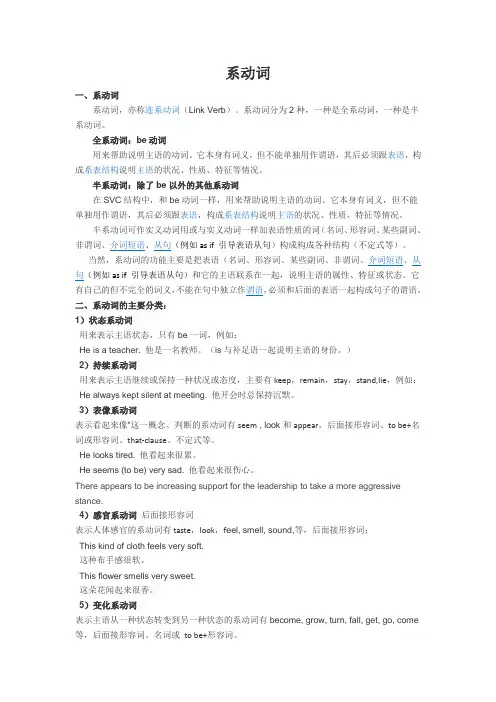
系动词一、系动词系动词,亦称连系动词(Link Verb)。
系动词分为2种,一种是全系动词,一种是半系动词。
全系动词:be动词用来帮助说明主语的动词。
它本身有词义,但不能单独用作谓语,其后必须跟表语,构成系表结构说明主语的状况、性质、特征等情况。
半系动词:除了be以外的其他系动词在SVC结构中,和be动词一样,用来帮助说明主语的动词。
它本身有词义,但不能单独用作谓语,其后必须跟表语,构成系表结构说明主语的状况、性质、特征等情况。
半系动词可作实义动词用或与实义动词一样加表语性质的词(名词、形容词、某些副词、非谓词、介词短语、从句(例如as if 引导表语从句)构成构成各种结构(不定式等)。
当然,系动词的功能主要是把表语(名词、形容词、某些副词、非谓词、介词短语、从句(例如as if 引导表语从句)和它的主语联系在一起,说明主语的属性、特征或状态。
它有自己的但不完全的词义,不能在句中独立作谓语,必须和后面的表语一起构成句子的谓语。
二、系动词的主要分类:1)状态系动词用来表示主语状态,只有be一词,例如:He is a teacher. 他是一名教师。
(is与补足语一起说明主语的身份。
)2)持续系动词用来表示主语继续或保持一种状况或态度,主要有keep,remain,stay,stand,lie,例如:He always kept silent at meeting. 他开会时总保持沉默。
3)表像系动词表示看起来像"这一概念、判断的系动词有seem, look和appear,后面接形容词、to be+名词或形容词、that-clause、不定式等。
He looks tired. 他看起来很累。
He seems (to be) very sad. 他看起来很伤心。
There appears to be increasing support for the leadership to take a more aggressive stance.4)感官系动词后面接形容词表示人体感官的系动词有taste,look,f eel, smell, sound,等,后面接形容词;This kind of cloth feels very soft.这种布手感很软。
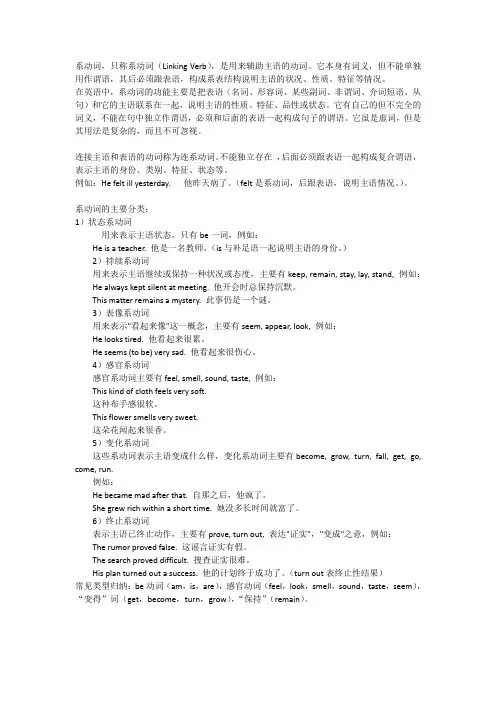
系动词,只称系动词(Linking Verb),是用来辅助主语的动词。
它本身有词义,但不能单独用作谓语,其后必须跟表语,构成系表结构说明主语的状况、性质、特征等情况。
在英语中,系动词的功能主要是把表语(名词、形容词、某些副词、非谓词、介词短语、从句)和它的主语联系在一起,说明主语的性质、特征、品性或状态。
它有自己的但不完全的词义,不能在句中独立作谓语,必须和后面的表语一起构成句子的谓语。
它虽是虚词,但是其用法是复杂的,而且不可忽视。
连接主语和表语的动词称为连系动词。
不能独立存在,后面必须跟表语一起构成复合谓语,表示主语的身份、类别、特征、状态等。
例如:He felt ill yesterday. 他昨天病了。
(felt是系动词,后跟表语,说明主语情况。
)。
系动词的主要分类:1)状态系动词用来表示主语状态,只有be一词,例如:He is a teacher. 他是一名教师。
(is与补足语一起说明主语的身份。
)2)持续系动词用来表示主语继续或保持一种状况或态度,主要有keep, remain, stay, lay, stand, 例如:He always kept silent at meeting. 他开会时总保持沉默。
This matter remains a mystery. 此事仍是一个谜。
3)表像系动词用来表示"看起来像"这一概念,主要有seem, appear, look, 例如:He looks tired. 他看起来很累。
He seems (to be) very sad. 他看起来很伤心。
4)感官系动词感官系动词主要有feel, smell, sound, taste, 例如:This kind of cloth feels very soft.这种布手感很软。
This flower smells very sweet.这朵花闻起来很香。
5)变化系动词这些系动词表示主语变成什么样,变化系动词主要有become, grow, turn, fall, get, go, come, run.例如:He became mad after that. 自那之后,他疯了。
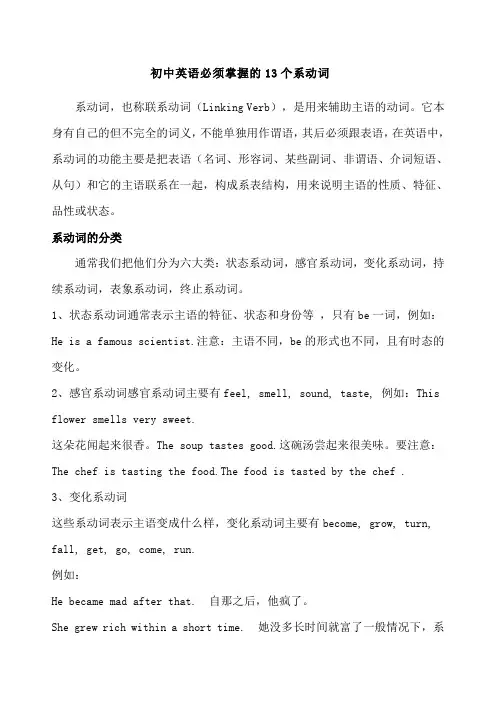
初中英语必须掌握的13个系动词系动词,也称联系动词(Linking Verb),是用来辅助主语的动词。
它本身有自己的但不完全的词义,不能单独用作谓语,其后必须跟表语,在英语中,系动词的功能主要是把表语(名词、形容词、某些副词、非谓语、介词短语、从句)和它的主语联系在一起,构成系表结构,用来说明主语的性质、特征、品性或状态。
系动词的分类通常我们把他们分为六大类:状态系动词,感官系动词,变化系动词,持续系动词,表象系动词,终止系动词。
1、状态系动词通常表示主语的特征、状态和身份等,只有be一词,例如:He is a famous scientist.注意:主语不同,be的形式也不同,且有时态的变化。
2、感官系动词感官系动词主要有feel, smell, sound, taste, 例如:This flower smells very sweet.这朵花闻起来很香。
The soup tastes good.这碗汤尝起来很美味。
要注意:The chef is tasting the food.The food is tasted by the chef .3、变化系动词这些系动词表示主语变成什么样,变化系动词主要有become, grow, turn, fall, get, go, come, run.例如:He became mad after that. 自那之后,他疯了。
She grew rich within a short time. 她没多长时间就富了一般情况下,系动词没有进行时态,但是这些表示变化类的系动词,是可以用进行时态的,例如It was becoming cold, so we lit the fire. 天气变冷了,所以我们点起了火另外某些含有变化意义的动态系动词如get, become, grow, turn等的进行时态可与形容词的比较级连用,表示渐进过程,其意思是“越来越……”。
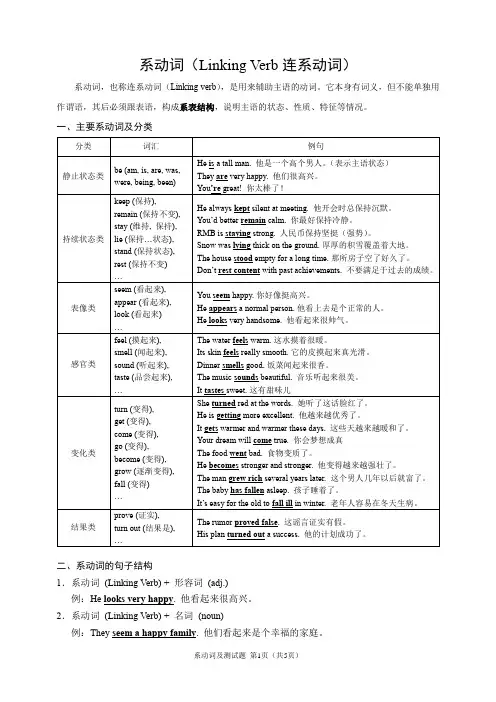
系动词(Linking Verb连系动词)系动词,也称连系动词(Linking verb),是用来辅助主语的动词。
它本身有词义,但不能单独用作谓语,其后必须跟表语,构成系表结构,说明主语的状态、性质、特征等情况。
一、主要系动词及分类二、系动词的句子结构1.系动词(Linking Verb) + 形容词(adj.)例:He looks very happy. 他看起来很高兴。
2.系动词(Linking Verb) + 名词(noun)例:They seem a happy family. 他们看起来是个幸福的家庭。
系动词测试题一、选择题1.The cloth that smooth and soft .A. feels; sells wellB. feels; is well soldC. is felt; sells wellD. is felt; sells good2.Happy birthday, Alice! So you have twenty already.A. becomeB. turnedC. grownD. passed 3.Your suggestion bad.A. hearsB. soundsC. listens toD. listens 4.Later he a doctor.A. becameB. turnedC. grownD. passed5.It's cold.A. becomingB. turningC. goingD. coming 6.The running water makes the stones very smooth.A. soundB. tasteC. smellD. feel 7.— There are dark clouds, and the wind is blowing strongly.— It that a typhoon is coming.A. feelsB. soundsC. seemsD. looks 8.— Three-D printing technology could be used to build a house in less than 24 hours.— It amazing. It’s my first time to get to know the news.A. looksB. smellsC. soundsD. tastes 9.— What will a science museum be like if you are asked to build one?— I hope it will like a book.A. tasteB. soundC. lookD. smell 10.— The medicine awful. I can’t stand it.— I see, Jimmy. But it’s helpful for you.A. tastesB. eatsC. drinksD. takes 11.Mom is cooking dinner. It so nice.A. smellsB. tastesC. feelsD. sounds12.— Do you know the song Gangnam Style?— Of course. It interesting.A. tastesB. smellsC. soundsD. feels 13.Some of my friends eat with their eyes. They prefer to order what nice.A. feelsB. smellsC. looksD. tastes14.I like soft and gentle music. It nice.A. tastesB. looksC. soundsD. feels 15.The meat smells . Throw it away.A. wellB. goodC. badlyD. bad 16.The cookies good. Could I have some more?A. tasteB. smellC. feelD. sound 17.This piece of music beautiful.A. looksB. soundsC. tastesD. smells 18.This kind of paper soft.A. feelsB. tastesC. smellsD. sounds 19.This sentence right. Please write it down.A. feelsB. soundsC. tastesD. smells 20.— I sleepy today.— Drink some tea, and you’ll be good as new.A. feelB. keepC. turnD. grow 21.— How nice the music sounds!— It does! The peaceful music will make you feel .A. excitedB. boredC. movedD. relaxed 22.— Dinner is ready. Help yourself!— Wow! It delicious. Could you please tell me how to cook it?A. tastesB. looksC. soundsD. feels二、根据汉语意思,在空白处填写适当的系动词。
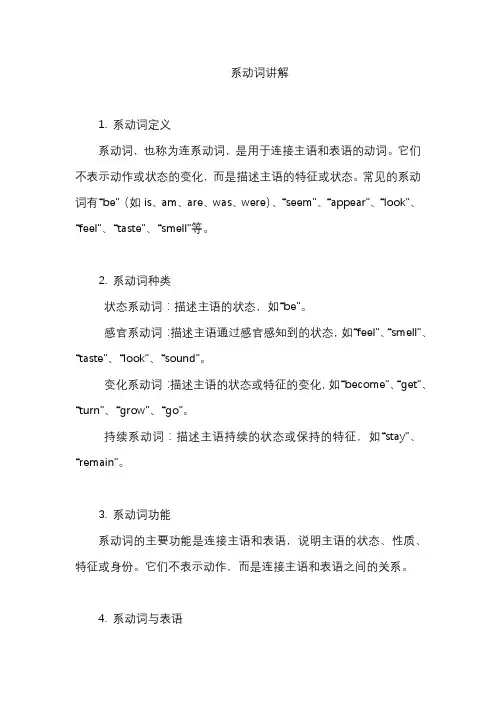
系动词讲解1. 系动词定义系动词,也称为连系动词,是用于连接主语和表语的动词。
它们不表示动作或状态的变化,而是描述主语的特征或状态。
常见的系动词有“be”(如is、am、are、was、were)、“seem”、“appear”、“look”、“feel”、“taste”、“smell”等。
2. 系动词种类状态系动词:描述主语的状态,如“be”。
感官系动词:描述主语通过感官感知到的状态,如“feel”、“smell”、“taste”、“look”、“sound”。
变化系动词:描述主语的状态或特征的变化,如“become”、“get”、“turn”、“grow”、“go”。
持续系动词:描述主语持续的状态或保持的特征,如“stay”、“remain”。
3. 系动词功能系动词的主要功能是连接主语和表语,说明主语的状态、性质、特征或身份。
它们不表示动作,而是连接主语和表语之间的关系。
4. 系动词与表语系动词后通常接表语,表语可以是名词、形容词、副词、介词短语、不定式、动名词等。
表语用来描述或解释主语的状态或特征。
5. 系动词与语态系动词与语态的关系不像动作动词那样直接。
一般来说,系动词没有被动语态。
因为系动词描述的是主语的状态或特征,而不是动作,所以通常不需要使用被动语态。
6. 系动词时态系动词的时态与常见的动词时态相同,包括一般现在时、一般过去时、一般将来时、现在进行时、过去进行时、现在完成时、过去完成时等。
根据具体语境和需要选择合适的时态。
7. 系动词常见错误误用系动词:将动作动词误用作系动词,或将系动词误用作动作动词。
表语与宾语混淆:将表语误认为是宾语,或反之。
时态不一致:系动词与其后的表语时态不一致。
8. 系动词使用技巧明确主语与表语关系:在使用系动词时,首先要明确主语与表语之间的关系,选择合适的系动词来描述这种关系。
注意时态和语态:根据具体语境选择合适的时态和语态,确保句子表达准确。
避免冗余和重复:在使用系动词时,避免冗余和重复,尽量使句子简洁明了。
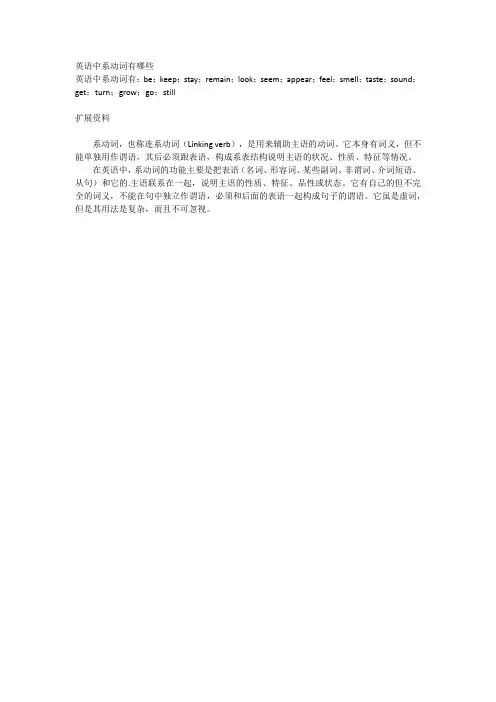
英语中系动词有哪些
英语中系动词有:be;keep;stay;remain;look;seem;appear;feel;smell;taste;sound;get;turn;grow;go;still
扩展资料
系动词,也称连系动词(Linking verb),是用来辅助主语的动词。
它本身有词义,但不能单独用作谓语,其后必须跟表语,构成系表结构说明主语的状况、性质、特征等情况。
在英语中,系动词的功能主要是把表语(名词、形容词、某些副词、非谓词、介词短语、从句)和它的.主语联系在一起,说明主语的性质、特征、品性或状态。
它有自己的但不完全的词义,不能在句中独立作谓语,必须和后面的表语一起构成句子的谓语。
它虽是虚词,但是其用法是复杂,而且不可忽视。
系动词系动词亦称联系动词(Link Verb),作为系动词,它本身有词义,但不能单独用作谓语,后边必须跟表语(亦称补语),构成系表结构说明主语的状况、性质、特征等情况。
说明:有些系动词又是实义动词,该动词表达实义时,有词义,可单独作谓语,例如:He fell ill yesterday. 他昨天病了。
(fell是系动词,后跟补足语,说明主语情况。
)He fell off the ladder.他从梯子上摔下来。
(fell是实义动词,单独作谓语。
)fall asleep 入睡fall ill(系表)fall off (实义动词)1:状态系动词用来表示主语状态,只有be一词,例如:He is a teacher.他是一名教师。
(is与补足语一起说明主语的身份。
)原形be is am are , 过去式was were , 过去分词been 现在分词或动名词beingbe 后可以接什么作表语?①接名词【我是教师。
】I am a teacher.②接数词【我妈妈41。
】My mother is forty-one.③接介词短语【我在教室里。
】I am in the classroom.④接副词【他出去了。
】He is out.【他不在家。
】He is not in.⑤接形容词【她是健康的。
】She is healthy.⑥动名词【眼见为实。
】Seeing is believing.⑦不定式【眼见为实。
】To see is to believe.2:持续系动词持续系动词用来表示主语继续或保持一种状况或态度,主要有keep, rest, remain, stay, lie, stand;例如:【他开会时总保持沉默。
】He always kept silent at meeting.【此事仍是一个谜。
】This matter rests a mystery.保持健康:keep healthy,keep in good health,stay healthy3:表像系动词用来表示"看起来像"这一概念,主要有seem, appear, look;例如:【他看起来很累。
常见的系动词有哪些(总2页)--本页仅作为文档封面,使用时请直接删除即可----内页可以根据需求调整合适字体及大小--常见的系动词有哪些1.表感官的系动词:look, sound, taste, smell, feel(这些词用形容词作表语) 2.表似乎的系动词seem, appear 3.表变化的系动词:beco me, get, turn, grow, make, come, go, fall, run 4.表依旧的系动词:remain, keep, stay, continue, stand, rest, lie, hold 5.可带名词作表语的系动词:become, make, look, sound, fall, prove, remain, turn(该词后接的单数名词前多不用冠词。
如:He turned teacher.)6.如果读者对于这个语法现象还是不怎么理解的话,可以以这个名句为例子学学:the man who dies rich dies disgraced.在巨富中死去,是一种耻辱。
其中的rich and disgraced 是说明主语的性质的。
1)状态系动词用来表示主语状态,只有be一词,例如:He is a teacher. 他是一名教师。
(is与补足语一起说明主语的身份。
)2)持续系动词用来表示主语继续或保持一种状况或态度,主要有keep, rest, remain, stay, lie, stand, 例如:He always kept silent at meeting. 他开会时总保持沉默。
This matter rests a mystery. 此事仍是一个谜。
3)表像系动词用来表示"看起来像"这一概念,主要有seem, appear, look, 例如:He lo oks tired. 他看起来很累。
He seems (to be) very sad. 他看起来很伤心。
系动词一、分类1.表示状态变化的系动词。
become , get , go , grow , turn2.表示感官的系动词。
look , feel , smell ,sound , taste 3.表示持续的系动词。
keep , stay , remain二、用法1.系动词+adj2.系动词无被动※动词短语:1.动词+away构成的短语:throw away扔掉put away 把…收好give away 捐赠,分发carry away 运走run away 潜逃,跑开go away 走开2.动词+for构成的短语:call for提倡,要求plan for打算,为…计划hope for希望,期待ask for请求,寻找,需要send for派人去请go for努力获取pay for偿还,赔偿wait for等待look for寻找3.动词+on构成的短语:try on试穿,试验put on穿上,上演have on穿着,戴着hold on别挂断;坚持住carry on继续开展keep on继续go on继续get on上(车、船)come on赶快4.动词+over构成的短语:come over过来hand over移交go over仔细检查,复习get over克服,恢复look over检查think over仔细考虑take over接受,接管turn over翻转5.动词+up构成的短语:bring up抚育,培养call up召唤,打电话给come up走进,上来cut up切碎fix up修理give up放弃go up上升,增长grow up长大look up尊敬,向上看,查寻make up虚构,弥补,组成put up举起,搭建;张贴pick up捡起,(开车)接某人,偶然得到set up建立,创纪录send up发射show up揭露,露面turn up出现,把…调高一点take up占据;开始从事6.动词+out构成的短语:work out算出look out当心,小心turn out结果证明是put out扑灭,熄灭,伸出come out出来,开花,出版,发行break out战争、火灾、洪水爆发set out着手,出发,起程keep out把---挡在外面go out出去,熄灭wear out穿破run out用完give out放出、发出(光、热等);耗尽、用完;筋疲力尽7.break +介词/副词的短语:break down出故障,身体垮掉break out爆发break through突破,突围break off中断,突然停止break up打碎,分解,驱散break in打断,闯入break into破门而入break away突然离开,逃脱,脱离8.bring +介词/副词的短语:bring about使发生bring back拿回来,使恢复bring down打倒,降低,推翻bring in引进bring out出版,生产bring up培养,养育9.call +介词/副词的短语:call after以---命名call back召回call up征召入伍,给某人打电话,使想起call on号召,拜访某人call in召集call off取消e +介词/副词的短语:come in进来come from来自于come about产生come over过来come out出来,出现,出版come by从旁经过come up上来,走进come across偶遇come after跟着---来come back回来come around恢复知觉,回来come down下来,倒塌11.cut +介词/副词的短语:cut in插嘴,插入cut across抄近路cut off切断cut up切碎cut down砍倒,削减cut out切掉,裁剪出12.get +介词/副词的短语:get through通过,度过,打通(电话)get in进入,陷入get on上车,进展,融洽相处get off下车,下来get across通过,被理解get along进展,融洽相处get away离开,脱身13.give +介词/副词的短语:give up放弃give in屈服,投降give away赠送,捐赠,泄漏give over移交,交出give off放出(气味),发出give out分发,放出(光、热) give back归还14.go +介词/副词的短语:go ahead着手,开始(做),进行go along进展,前进go around到处走动,顺便访问go away离去,走开go beyond超过go by过去,流逝go down下降go up上升go for喜欢go off离开,停止go over复习,温习go through经历,穿过15.look +介词/副词的短语:look after照顾,照料look up查阅look around环顾look at看look down朝下看look for寻找look into调查look out当心look through浏览,检查16.take +介词/副词的短语:take away拿走take down写下,记下take in欺骗;吸收,吸纳take off起飞;脱下take on 承担;呈现;开始雇佣take over 接收,接管take pictures照相take care of照顾,照料take up 占据;开始从事take it easy别紧张take me for example以我为例17.turn +介词/副词的短语:turn about/ round(使)向后转,转身turn against(使)反对(某人)turn away转过脸去,拒绝turn back往回走turn up调高,出现turn down调低,拒绝turn in上缴,上交turn into(使)变成turn off关掉turn on打开turn out生产,结果是turn to求助于,转向18.put +介词/副词的短语:put aside把---放在一边,积蓄put back把---放回原处put down放下,镇压put forward提出,建议put in放进put off推迟,拖延put on穿上,戴上,增加,上演put out扑灭;熄灭put up举起,张贴19.be/get/become +P.P./adj.+介词的短语:be dressed in穿着be fond of爱好,喜爱be lost in沉溺于be located in位于be used to 习惯于be curious about对---好奇be glad to乐意---be worried about=worry about担心be covered with 被…覆盖be/get ready for (doing ) sth.= be ready to do sth为…作好准备be surprised (at)对…感到惊讶be surprised to do sth. 对干某事感到很惊讶be interested in (doing) sth.对…有兴趣be born in/ on 出生于be on …在进行;在上演;(灯)亮着be able to do sth.= can do能够做…be afraid of (doing) sth /to do sth./ that从句害怕…/不敢做…/恐怕…)be angry with /about sb. 生某人的气be angry at/about sth. 生某事的气be a symbol of sth是…的象征be famous/known for sth. 以某物而著名be full of =be filled with sth.填/充/装be famous/known as+职业作为…而著名be famous/known to sb. 为某人所熟知be strict with sb对某人严格要求be strict in sth. 对某事严格要求be/come from来自…be hungry/thirsty/tired饿了/渴了/累了be (well) worth doing(非常)值得做…be covered with被…所覆盖…be in (great) need of (很)需要…be short of sth. 短缺…be in trouble/danger处于困境/危险中be late for … 迟到be made of sth.由…制成(能看出原材料)be made from sth.由…制成(看不出原材料)be made in +sp在某地制成be made by sb.被/由某人制成be made up of sth.由…组成be made into sth.某物被制成…be satisfied/pleased with对…感到满意be free 空闲的,有空be ill in bed卧病在床be busy doing/with sth忙于(做)某事。
系动词的定义:系动词(Linking verb)是一种不表示动作或者动态意义的动词,主要用来连接主语和表语,表达主语的状态、性质、特征等。
系动词通常没有实际含义,而是在句子中起到连接作用。
例如,在句子“她是一名医生。
”中,动词“是”就是一个系动词,连接主语“她”和表语“一名医生”。
在这个例子中,“是”并没有表示什么动作,它的作用仅仅是连接两个部分,表达主语的职业身份。
常见的系动词包括:be、seem、appear、become、grow、feel等。
系动词分类:1)状态系动词用来表示主语状态,只有be一词,例如:He is a teacher. 他是一名教师。
(is与补足语一起说明主语的身份。
)2)持续系动词用来表示主语继续或保持一种状况或态度,主要有keep, remain, stay, lie, stand, 例如:He always keeps silent at meeting. 他开会时总保持沉默。
This matter remains a mystery. 此事仍是一个谜。
3)表像系动词用来表示"看起来像"这一概念,主要有seem, appear, look, 例如:He looks tired. 他看起来很累。
He seems (to be) very sad. 他看起来很伤心。
4)感官系动词感官系动词主要有look,feel, smell, sound, taste, 例如:This kind of cloth feels very soft.这种布摸起来很软。
This flower smells very sweet.这朵花闻起来很香。
5)变化系动词这些系动词表示主语变成什么样,变化系动词主要有become, grow, turn, fall, get, go, come, run.例如:He became mad after that. 自那之后,他疯了。
系动词系动词亦称联系动词(Link Verb),作为系动词,它本身有词义,但不能单独用作谓语,后边必须跟表语(亦称补语),构成系表结构说明主语的状况、性质、特征等情况。
说明:有些系动词又是实义动词,该动词表达实义时,有词义,可单独作谓语,例如:He fell ill yesterday.他昨天病了。
(fell是系动词,后跟补足语,说明主语情况。
)He fell off the ladder.他从梯子上摔下来。
fell是实义动词,单独作谓语。
1)状态系动词用来表示主语状态,只有be一词,例如:He is a teacher. 他是一名教师。
(is与补足语一起说明主语的身份。
)2)持续系动词用来表示主语继续或保持一种状况或态度,主要有keep, rest, remain, stay, lie, stand, 例如:He always kept silent at meeting. 他开会时总保持沉默。
This matter rests a mystery. 此事仍是一个谜。
3)表像系动词用来表示"看起来像"这一概念,主要有seem, appear, look, 例如:He looks tired. 他看起来很累。
He seems (to be) very sad. 他看起来很伤心。
4)感官系动词感官系动词主要有feel, smell, sound, taste, 例如:This kind of cloth feels very soft.这种布手感很软。
This flower smells very sweet.这朵花闻起来很香。
5)变化系动词这些系动词表示主语变成什么样,变化系动词主要有become, grow, turn, fall, get, go, come, run.例如:He became mad after that. 自那之后,他疯了。
She grew rich within a short time. 她没多长时间就富了。
系动词1. 最常用连系动词:be(am; is/was; are/were)。
2. 表变化的系动词:get; turn; go; fall; become; grow; come; run。
Eg: It is becoming colder and colder.The food has gone bad.此处还需注意的是become和turn后接表职业的名词时冠词的有无:Eg: Two years later, he became a teacher.但Two years later, he turned teacher.另外,go表变化时一般指事情向消极、不好的方面转化。
3. 所谓“感官动词”:look; sound; taste; smell; feel。
一般它们在句子中译成:。
起来;。
上去。
此类系动词为高考高频词。
Eg: The food tasted good.食物尝起来很香。
Eg: He looked sadly at the picture. /She looked sad after hearing the news.Tom tasted the food and it tasted good.4. 表状态的系动词:keep; stay; remain;(依然是;保持)Eg: She remains loyal to her father despite his cruelty towards her.What a lovely day today! I love fine weather and Ihope it will stay fine for some more days.Much remains to be done.5. 表像系动词:seem; appear。
汉语意义:看起来像、似乎、好像。
这两个动词有一个共同的特点,即如果要表达时态的变化,需要后接不定时来完成。
Eg: He seemed to have caught cold./ When Father came in, Tom seemed to be eating something.句型转换也要要求牢记It seemed that he had caught cold.When Father came in, it seemed that Tom was eating something.6. 终止系动词:prove; turn out。
表达“证实、证明、结果为。
”之意。
Eg: He proved (to be) right. / The experiment turned out successful.系动词用法应注意的几个问题1.一般地说,系动词无进行时态,无被动语态如:Your hand feels cold.The soup tastes good.The dinner smells good.2.系动词的时态与形容词的比较级连用的问题。
某些含有变化意义的动态系动词如get, become, grow, turn等的进行时态可与形容词的比较级连用,表示渐进过程,其意思是“越来越……”。
例如:He is growing taller and taller.Our life is getting better and better.Things are getting worse.3.所有半系动词的被动语态要分情况讨论。
英语中某动词在作系动词用时,无被动语态,而作实义动词用时,才有被动语态,二者不可混为一谈。
例如:不能说:The apple is tasted good.因为taste此时是系动词,“尝起来”之意,指的是苹果的性质,无被动语态)但我们可以说:The apple is tasted by me.这苹果被我尝了一下。
(taste此时指“尝一尝”这一动作,有被动语态)因此,在平时的英语教学和学习之,要有意注意半系动词在具体的语言环境中到底是系动词用法还是实义动词用法,要注意区分、识别。
4.瞬间动态系动词能否与时间段连用的问题英语中某些表示瞬间意义的系动词不能与“for+时间段,since+时间点,how long until+时间,by + 时间,so far”等直接连用。
例如:①不能说:He has become a teacher for 2 years.应改为:He has been a teacher for 2 years.②不能说:He has turned writer since 3 years ago.应改为:He has been a write since 3 years ago.或It is two years since he turned writer.③不能说:He got angry until his child came back home. 应改为:He didn’t get angry until his child came back home.5.系动词能接几种表语(从句)系动词除了接adj.\n.\prep.短语,还可接以下几种表语形式:①能接as if/as though表语从句的系动词有:look(看起来),smell(闻起来),sound(听起来),feel(觉得);appear(显得),seem(似乎)。
例如:It looks as if we are going to have snow.看样子天要下雪了。
He looked as if he had just stepped out of my book of fairy tales.他看来好像刚从我的童话故事中走出来似的。
She seemed as if (though) she couldn’t understand why Laura was there.看来她好像不能理解为什么劳拉呆在那儿。
It so unds to me as though there’s a tap running somewhere.我好像听到某处水龙头流水的声音。
She felt as if her head were splitting.她仿佛觉得她的头要裂开了。
The river appeared as if enveloped in smog.那条河好像笼罩在烟雾之中。
It seems as if it were spring already.好像已是春天了。
②可用于“It+系动词+that从句”结构的有:seem, appear 如:It seemed that he had made some serious mistakes in his work.好像他在工作中犯了严重错误。
It appeared that he was talking to himself.好像他在自言自语。
③能用不定式作表语的系动词有:be, seem, , look, appear, prove, grow.Her job is to look after the children.她的工作是照料孩子们。
He seems not to look after the children.他好像不是她的父亲。
He looks to be a young girl of twenty.他看起来像是一个20岁的年轻姑娘。
He didn’t appear to dislike it.看不出他憎恨此事。
My advice proved to be wrong.我的建议证明是错误的。
④能与there连用的系动词有:be, appear, seem. There appeared to be only one room.那儿好像只有一个房间。
There seems(to be)no need to go.似乎没有必要走。
Exercise1.The story sounds_________________A. to be trueB. as trueC. being trueD. true2.Those oranges taste__________A. goodB. wellC. to be goodD. to be well3.---Are you feeling___________? ---Yes, I’m fine nowA. any wellB. any betterC. quite goodD. quite better4.----Can I join the club, Dad. ----You can when you _________a bit older.A. getB. will getC. getsD. will have got5.---Do you like the material? ----Yes, it _______very soft.A. is feelingB. feltC. feelsD. is felt6.I love to go to the seaside on Summer. It_____ good to lie in the sun or swim in the cool sea.A. doesB. feelsC. getsD. makes7.Cleaning women in big cities usually get _______ by the hour.A. payB. payingC. paidD. to pay8.Why don’t you put the meat in the fridge? It will _____ fresh for several days.A. be stayedB. stayC. be stayingD. have stayed9.What you have said_______.A.is sounded interesting B.soundsinteresting C.sound interested D.listens interested 10.The class begins. Please keep________.A.silent B.silence C.the silence D.silently 11.Look! Several people in the crowd seemed_______. A.to be fighting B.to have fought C.being fought D.having fought12.How _____the song she sings sounds! I have never ______a better voice.A.beautifully, sounded B.beautiful,sounded C.sweet, listened to D.sweet, heard13.Her feeling about the marriage ______rather strange.A.is looked B.is seemed C.seems D.is appeared14.The new shirt______ right.A.doesn’t feel B.isn’t felt C.isn’tfeeling D.doesn’t touch15.How happy it_______ for me to be home again after twenty years abroad!A.gives B.feels C.is felt D.is given16.John _____driver since two months ago. A.became a B.has become a C.has turned D.has been a17.It _____he felt very _______over the death of the boy.A.seemed that, sad B.seemed as if,sadly C.looked as though, sad D.looked that, sadness18. _______ everyone here today?A. BeB. AreC.Is D. Am19. Harry is older than I. But he _______ younger than I.A. lookB. looksC.looked D. looking20. It _______ like the singing of the birds.A. soundsB. looksC.smells D. tastes21. This kind of cake tastes _______.A. goodB. wellC. to be goodD. to be well22. The children all looked _______ at the broken model plane and felt quite _______.A. sad, sadB. sadly, sadlyC. sad, sadlyD. sadly, sad23. This kind of paper _______ nice.A. feelB. feltC. is feelingD. feels24. This math problem is _______ and I can do it_______.A. easy, easilyB. easily, easilyC. easy, easyD. easily, easy25. Coffee is ready. How nice it _______! Would you like some?A. looksB. smellsC. soundsD. feels26. In winter the days _______ colder and colder.A. getsB. gettingC.got D. get参考答案:1—26DABAC BCBBA ADCAB DACBA ADDABD。